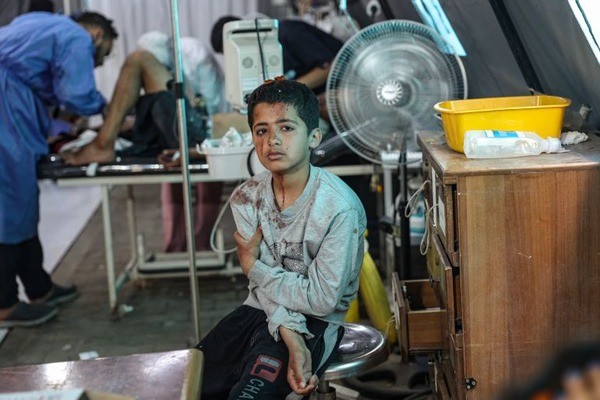Iran’s Plan to Strike Back Against the U.S.
Iran’s Military Preparations Following U.S. Attacks
Loading...

With just three days of fuel remaining, Southern Gaza hospitals face critical shortages, warns WHO, amidst hindered aid deliveries.
The head of the World Health Organization (WHO) issued a dire warning regarding the availability of fuel to power hospitals in the southern Gaza Strip, stating that there's only enough fuel left for three days. This warning comes after Israeli forces took control of the Rafah border crossing.
On Tuesday, Israeli ground troops and tanks entered Rafah and seized control of the nearby border crossing into Egypt, which serves as a vital route for aid into the besieged Palestinian territory.
Tedros Adhanom Ghebreyesus, the Director-General of WHO, expressed concern over the blocking of fuel that the UN health agency had expected to be allowed in on Wednesday. The flow of humanitarian aid into Gaza is under the control of Israeli authorities.
"The continued closure of the border crossing prevents the UN from delivering fuel. Without fuel, all humanitarian operations will cease. Additionally, border closures are hindering the delivery of essential aid into Gaza," Tedros stated on social media.
He emphasized the critical situation, highlighting that hospitals in southern Gaza have only three days' worth of fuel remaining, which could lead to a halt in essential services.
Israel has threatened a significant military operation in Rafah to combat what it claims are thousands of Hamas fighters entrenched in the area. However, Rafah also serves as a refuge for over 1.4 million Palestinians who have fled conflict zones farther north in the coastal enclave, following previous evacuation orders from Israel.
These displaced individuals are facing dire conditions in overcrowded tent camps and makeshift shelters, grappling with shortages of food, water, and medicine. The main maternity hospital in Rafah, which handles nearly half of Gaza's births, has halted admissions, according to the UN Population Fund (UNFPA).
Prior to the incursion into the city by Israeli forces, Al-Helal Al-Emairati Maternity Hospital was facilitating around 85 of the 180 daily births in Gaza.
Medical Aid for Palestine (MAP) received an update from Marwan Homs, the head of Abu Youssef al-Najjar Hospital in Rafah, indicating that the facility is no longer operational as all staff have been instructed to evacuate.
The strained healthcare system in Rafah now faces critical shortages, with only three medical facilities left: Kuwaiti Hospital, a 16-bed NGO facility; Marwani field hospital, specializing in trauma care; and Al-Emairati Hospital, primarily for maternity services.
Amid these dire circumstances, Palestinian officials in Gaza accuse Israel of intentionally obstructing aid deliveries and targeting medical centers. Gaza's Government Media Office spokesman, Salama Marouf, condemned Israeli actions, alleging deliberate exacerbation of the humanitarian crisis by blocking aid at border crossings and striking hospitals and schools in eastern Rafah.
Israel denies impeding aid flow but acknowledges military operations in response to Hamas activities in eastern Rafah. Israeli forces have reportedly uncovered Hamas infrastructure and conducted targeted operations and airstrikes across Gaza.
In response to escalating violence, Israel has instructed tens of thousands of civilians to relocate to an "expanded humanitarian zone" in al-Mawasi, 20 km away, leaving Rafah's coastal area severely lacking essential resources.
Residential areas, medical facilities, and schools in Rafah have come under fire, exacerbating the dire humanitarian situation, as stated by Maarouf.
The Gaza Health Ministry reports over 35 Palestinian casualties within the past 24 hours, with many unable to access critical medical care due to border closures. Khalil al-Daghran, an official from Gaza's Ministry of Health, highlights the dire plight of the sick and wounded, exacerbated by a severe shortage of medical supplies.
Al-Daghran urges international intervention, calling on the United States and the broader global community to pressure Israel into ceasing hostilities and reopening border crossings.
Meanwhile, UN Relief and Works Agency for Palestine Refugees (UNRWA) officials report a significant exodus from Rafah since the start of Israeli incursions, with around 50,000 people fleeing the violence.
Iran’s Military Preparations Following U.S. Attacks
Troops remain in five strategic locations, raising fears of renewed tensions and long-term occupation.
Opposition forces have taken control of the capital after a significant offensive. Here is how it unravelled.
